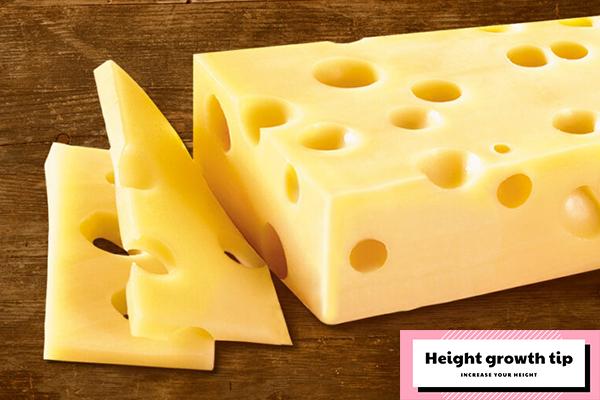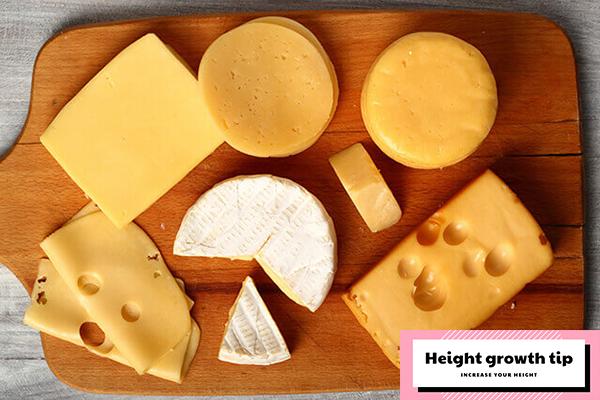Could the cheese you’re snacking on be helping you grow taller? The potential link between cheese consumption and increased height has been a subject of curiosity.
Cheese, with its rich flavors and versatility, has always been a beloved food. But what if this dairy delight held a secret power to unlock your full growth potential? It’s an intriguing idea worth exploring.
In our quest to understand factors influencing height, the role of cheese has emerged as an intriguing possibility. We’re diving deep into the nutritional aspects that might make cheese a key player in height development.
If you’ve ever wondered whether that gooey cheese topping your pizza or pasta could be a hidden ally in your quest for added inches, you’re not alone. Join us as we unravel the captivating connection between cheese and height, and uncover whether this beloved dairy product could be the secret ingredient for growth.
How does cheese affect height growth?

Cheese contains important nutrients like protein, calcium, vitamin D, and phosphorus that support growth and bone health. However, cheese alone won’t increase your height beyond your genetic potential.
Height is primarily determined by genetics, hormones, and overall nutrition. To maximize your natural height potential, you need a balanced diet providing all the necessary nutrients. Protein builds tissues like bones, while calcium, phosphorus, and vitamin D aid bone growth and strength.
Cheese can contribute calcium and protein towards meeting your nutritional needs for growth. But you can get these nutrients from various foods. A diverse diet with foods from all the major groups is key for supplying the nutrients needed for proper development.
Moderation is important – don’t overconsume any single food. Balance your diet and stay physically active. This supports healthy growth. Consult a healthcare professional if you have specific concerns about your height or growth.
What’s the Nutritional Value of Cheese?
Cheese encompasses a vast array of types, numbering in the hundreds worldwide. The characteristics of cheese, such as texture, flavor, and style, are shaped by a multitude of factors including milk source, butterfat content, processing techniques, presence of specific bacteria and molds, aging duration, and pasteurization status. Consequently, the nutritional composition of cheese varies significantly from one type to another. To delve into the nutritional information per one-ounce serving, please consult the table provided below.
| Type | Calories | Carbohydrate | Fat | Proteins | Calcium | Sodium |
| Brie | 95 | 0.1g | 7.8 g | 5.9g | 52 mg (4% of DV) | 178 mg (8% of DV) |
| Cheddar | 116 | 0.7g | 9.6g | 6.6g | 200 mg (15%) | 185 mg (8%) |
| Feta | 75 | 1.1g | 6.1g | 4g | 140 mg (11%) | 323 mg (14%) |
| Gouda | 101 | 0.6g | 7.8g | 7.1g | 198 mg (15%) | 232 mg (10%) |
| Mozzarella cheese | 85 | 0.7g | 6.3g | 6.3g | 143 mg (11%) | 138 mg (6%) |
| Parmesan | 119 | 3.5g | 7.9g | 8.4g | 251 mg (19%) | 496 mg (22%) |
| Goat cheese | 103 | 0g | 8.5g | 6.1 g | 84 mg (6%) | 118 mg (5%) |
| Switzerland | 111 | 0.4g | 8.8g | 7.7g | 252 mg (19%) | 52 mg (4%) |
| America | 87 | 2.5g | 6.5 grams | 4.6g | 390 mg (30%) | 363 mg (16%) |
| Blue | 100 | 0.7g | 8.1 g | 6.1 g | 150 mg (12%) | 325 mg (14%) |
The Delicious Health Benefits of Cheese
Cheese is more than just a tasty treat – it’s a nutritional powerhouse. This creamy dairy delight is packed with protein, calcium, phosphorus, vitamins B12 and A, zinc, and selenium. These nutrients support strong bones, muscle mass, immunity, and overall health.
Cheese is an excellent source of calcium and phosphorus, crucial for building and maintaining strong bones and teeth. This makes it particularly beneficial during growth periods and for preventing osteoporosis.
The high-quality protein in cheese helps repair tissues, build lean muscle, and boost immunity. It’s a great choice for athletes and anyone looking to stay active and healthy.
Many cheeses are rich in vitamins and minerals like vitamin B12 for nerve function, zinc for immunity, and probiotics for a healthy gut.
With its satisfying combination of protein and fat, cheese can help you feel fuller for longer, aiding in portion control and a balanced diet.
Enjoyed in moderation, cheese is a delicious way to nourish your body. Pair it with fruits, veggies, and whole grains for a well-rounded and nutritious meal.

Is Too Much Cheese Bad for You?
While cheese is delicious and nutritious, consuming excessive amounts can lead to several health issues:
- Weight Gain: Cheese is calorie-dense and high in fat, which can contribute to weight gain if consumed in excess.
- Digestive Issues: Many cheeses contain lactose, which can cause gas, bloating, and constipation for those with lactose intolerance.
- High Blood Pressure: Cheese is often high in sodium, which can raise blood pressure levels when consumed in large amounts.
- High Cholesterol: Full-fat cheeses are loaded with saturated fats that can elevate cholesterol levels and increase the risk of heart disease.
Enjoying Cheese in Moderation:
- Practice portion control: Limit yourself to 1-2 ounces per serving and no more than a few servings per day.
- Choose lower-sodium and lower-fat varieties when possible.
- Use cheese as a garnish or mix-in rather than a main ingredient.
- Balance cheese with high-fiber foods like whole grains and vegetables.
- Get creative with substitutions, such as using half the usual amount of cheese or replacing it with avocado for creaminess.
While cheese can be part of a healthy diet, moderation is key. Enjoy it as an accent to nutrient-dense foods rather than overindulging. A balanced approach allows you to satisfy your cravings without compromising your health
- Related post: Top 10 magnesium-rich foods help increase height

